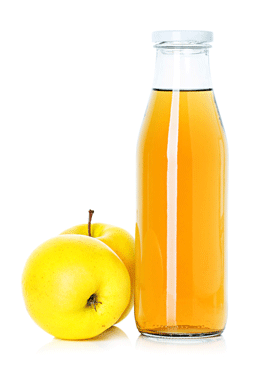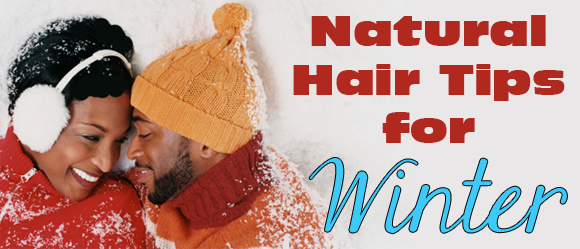The cold winter weather can be harsh on your hair and scalp. Whether you’re fully natural or still transitioning, here are some ways to ensure your hair thrives during the winter months.
1. Make an Apple Cider Vinegar Spray for Dry Scalp
 If you have severely dry scalp, it only gets worse in the winter.
If you have severely dry scalp, it only gets worse in the winter.
After you shampoo your hair, spray your scalp with a 50/50 mix of water and organic Apple Cider Vinegar (I use the Braggs brand.) The vinegar kills the bacteria that causes flaking.
Some people rinse afterwards, but I just leave mine in and use the spray as needed. Yes, the smell is a tad bit annoying, but it goes away after a few minutes.
2. Wear a Satin Bonnet Under Your Hats
Tucking your hair away from the elements is a good idea, but wool can snag and wreak havoc on natural hair. An easy remedy is to throw on a satin bonnet underneath the hat so it doesn’t tear up your tresses.
Here’s my favorite winter beanie style.
3. Condition Often
Deep conditioning is a must no matter the weather, but it’s even more important when the temperature drops because the cold air dries your hair out faster. Use thicker, creamier conditioners for long-lasting moisture.
Recommended Deep Conditioners
- Shea Moisture Raw Shea Butter
- Deva Curl
- Curl Junkie Rehab Moisturizing Hair Treatment
- As I Am Elation Intensive Conditioner
- Aussie Moist 3 Minute Miracle Moisture Treatment
4. Watch Your Clothing
If you’re wearing wool and your hair is long enough to reach your shoulders, pin it up or tuck it away because the material can snag your ends or cause split ends and breakage.
5. Don’t Use Humectants
Honey, glycerin and other humectants draw moisture out of air and into your hair, but in cooler temps, the opposite happens and they can actually dry your hair out even more.
Check those labels!
6. Use Heavier Sealants
After you moisturize your hair, seal it in with a thicker natural oil of your choice. My favorites are avocado and castor oil.
Jojoba is not as thick, but very good for your scalp because it closely matches your natural hair sebum, and is also wonderful for any kind of dry scalp condition. So if you suffer with more flaking in the colder months, keep some jojoba oil on hand.
7. If You’re Wearing Extensions…
Since your hair is drier in the winter, your edges are going to be more delicate. So if you are wearing extensions, make sure they aren’t too tight and always moisturize your hair with a diluted moisturizing mix.
Just because your hair is tucked away in twists or braids, doesn’t mean you stop your moisturizing routine.
I like to mix Knot Today with water and lightly mist my extensions every 3-4 days. You can do the same with any leave-in conditioner. I’m not a fan of the store-bought braid moisturizers because they often have “bad” ingredients that leave build up on your scalp.





I see you use castor oil in the winter but say not to use humectant. Castor is a humectant. I tried using this and my hair dried, the ends and at the root broke off despite hot oil treatments and deep conditioning. This winter, I am not using castor oil and my hair is better.
Hello,
I’m glad to have found your site. I like that you explain what to use on natural hair, why and how so easily. So, I thought maybe you could help me with this problem I have.
I’ve been natural for about five years now and although I love my natural hair way more than my chemically treated hair, right now I am at a crossroads. I’ve been trying to grow my hair past the nape of my neck since I stopped perming. Like you, I opted to go natural without chopping all of my hair off. It actually worked! But every time I manage to grow some sort of length I get a blow out, jut to check my progress, and the stylist tells me that unfortunately my hair is once again unhealthy and must be cut at the ends. I end up losing the poor pathetic 3 to 4 inches I work all season to grow.
I do twist outs and braid outs and have been using Shea Moisture and as close to all natural products as I think I can get (if there’s anything more specific please let me know) for about two years now and I love the products but still suffer from extreme breakage. I deep condition every two weeks, add olive oil to the conditioner. When I do a twist out I spritz my hair with water to make it damp and manageable then will use coconut oil as a sealant for my twists or braids. I cover my head with a satin bonet or scarf at night and in the morning spritz again and use more oil to take the twists down. My hair does usually feel very greasy but I’m afraid that if I don’t grease it/moisturize it so often it will look dull and be hard to the touch. There’s nothing worse than my 4c hair looking and feeling like an untouchable mess. Should I only part my hair and use oil on my scalp? What can I do to reduce all this breakage, improve my hair growth and retention, and keep it soft, workable, and shiny? Please please please help me if you can. If I’m doing this whole natural thing wrong please tell me because, honestly I’m just about ready to return to a perm, get a texturizer, a keratin treatment, anything to improve my hair growth and feel. I’m at a loss. I don’t know what to do. Please help with some pointers, suggestions, rules or tips.
-Breshay
Use water, a leave in and the the oil. Also look into the greenhouse effect… My hair loves it. I too am a type 4 hair texture.
Have you considered that coconut oil may be the culprit. Most people use it as a prepoo rather than as a sealant especially in the winter months because it can make the hair dry. There are a big proportion of us who can cannot use it on is own. Maybe try olive oil as a sealant and see how your hair responds
Hello! I have been wondering when we would hear from you again!!
I have been staying away from humectants and making sure my daughters do the same. I’m a “PJ” and spend LOTS of time reading labels. I made a list of humectants and TRY to avoid them like the pledge!!
As always, thx for the info!!
God Bless&take care
Hi Kimberly!
Yes it’s been awhile, I know. 🙂 Thanks for reading.
Thanks for this for I’m learning as I go. Let’s say if my hair was not in a protective style during the winter do you recommend cowashing only? I ask this due to my friend, she was telling me it’s much better for the hair also than going through the other process.
Yes that’s also an option. Some do co-wash or shampoo less frequently to keep the scalp from getting too dry. I am one of those who feels I need shampoo but I also dilute it so it’s not as strong/drying.
Hi Lisa…thanks so much for your natural care knowledge and tutorials..they are a huge help..I’m transitioning and trying to hold out. I had lots for 6 years but that’s a totally different natural…although I loved my hair in that state..I can’t wait to see what’s to come in the next year..I’m 3 months in now…THANKS AGAIN